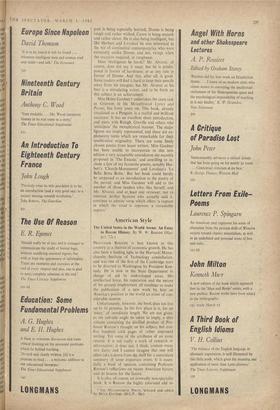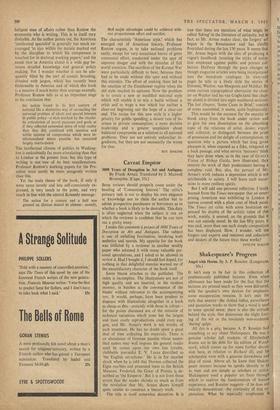American Style
Pnoi.Lssott RosTow is best known in this country as a theorist of economic growth. He has also been a leading light in the Harvard/Massa- chusetts Institute of Technology constellation, and was -one of the first of the Cambridge stars to be diverted to Washington by President Ken- nedy. He is now in the State Department in charge of aid to undeveloped areas. His intellectual force, his reputation and the nature of his present employment all combine to make the publication of a new work by him on America's position in the world an event of con- siderable interest.
Unfortunately, however. the book does not live up-to its promise. In the first place it is, for an 'essay,' of inordinate length. We are not given, as the sub-title might be taken to imply, a slim volume containing the distilled product of Pro- fessor Rostow's thought on his subject, but over five hundred solid pages of rather unpinned writing. Yet some of the attributes of an essay
remain. It is not really a work of research or information;• it does not, I think, contain many
new facts; and I cannot imagine that one will
often take it down from the shelf for a convenient summary of some important event. It is essen- tially a book of opinion, containing Professor Rostow's reflections on recent American history and its lessons for the future.
It is also, of course. an avowedly non-specialist book. It is Rostow the highly informed and in t Tot. Mt 1\noystuAt. Por.rs. Selected and edited b) Helen Gardner. (O.U.P.. 18s.) telligent man of affairs rather than Rostow the economist who is writing. This is in itself very desirable. As the author points out, the American 'intellectual specialist' is generally too much en- couraged 'to stay within the terrain marked out by the discipline to which his competence is vouched for in doctoral working papers,' and the result (not in America alone) is a wide gap be- tween detailed knowledge and general policy making. Yet I wonder whether it can be ade- quately filled by the sort of cosmic brooding, clouded with jargon, which has recently been fashionable in America and of which this book is a massive if much better than average example. Professor Rostow tells us at an important stage in his conclusion that the nation found in its first century of national life a distinctive way of reconciling the universal problem of ideals and special interests in public policy—a style marked by the ritualis- tic articulation of moral purposes and goals as if they reflected somewhat more of total reality than they did, combined with sensitive and subtle systems of compromise which were in- stitutionalised where possible but remained largely inarticulated.
The intellectual climate of politics in Washing- ton is undoubtedly far more stimulating than that in London at the present time, but this type of writing is not one of its best manifestations. Professor Rostow's working papers for the Pre- sident must surely be more pungently written than this.
Yet the main theme of the book, if only it were more tersely and less self-consciously ex- pressed, is very much to the point, and very much in line with the central Kennedy message:
The nation for a century and a half was granted an illusion denied its citizens: namely, that major advantages could be achieved with- out proportionate effort and sacrifice.
The characteristic 'American style,' which has emerged out of American history, Professor Rostow argues, is to take national problems easily, except for very occasional bursts of great communal effort, conducted under the spur of supreme danger and with the stimulus of full world attention. The sacrifices of the Korean War were particularly difficult to bear, because they had to be made without this spur and without this stimulus. The effort of making them led to the reaction of the Eisenhower regime when the old style reached its epitome. Now the problem is to create a new or modified national style which will enable it to win a battle without a crisis and to wage a war which has neither a clear-cut beginning nor the hope of a clear-cut end. The recipe for this new style is a higher priority for public spending, a slower rate of in- crease in private consumption, a more decisive leadership and a greater scepticism about balanced compromise as a solution to all national problems. They are not entirely unfamiliar in- gredients, but they are not necessarily the worse for that.
ROY JENK INS







































 Previous page
Previous page